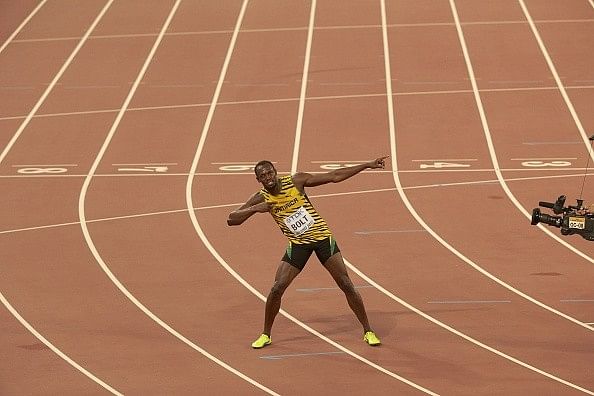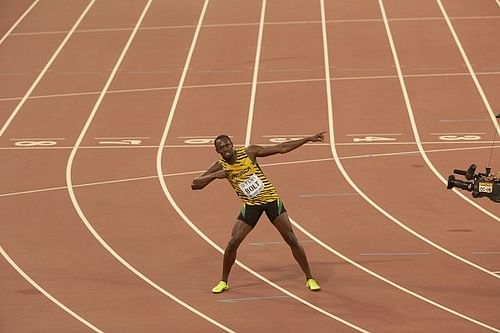
When push comes to shove, expect Usain Bolt to raise the bar

Justin Gatlin looked subdued, pressurized and encumbered by the mighty weight of the headlines during the 100m final at the 2015 World Championships in Beijing on Sunday night. His burgeoning confidence had been pierced by the larger-than-life aura of a man who beat him in the last 30m at the finish line – Usain Bolt.
Yes, there he was with that swagger, the nonchalance and the irresistible charisma. There he was – the showman and the champion, Usain Bolt, strutting his way around the Bird’s Nest, posing for the shutterbugs and the screaming fans just as he had done at the Olympics seven years ago. Except that this time, the circumstances were a lot different.
Billed as the battle to save the ‘soul of the sport’, athletics’ blue riband event had turned into a highly-awaited competition where a verdict on righteousness was to be declared. If anything, the lead-up to the prestigious global event had not been something that the sport’s governing body had envisaged.
Athletics has been rocked with a string of doping scandals recently, with new media reports emerging about nearly 800 athletes having suspicious results between 2001 and 2012. Ironically, amidst this deepening crisis, it was the dope-tainted Justin Gatlin who was the standout sprinter this year with mind-boggling times at the races he competed in.
Justin Gatlin’s 28-match winning streak
Carrying the blemish of having been banned twice – in 2001 and 2006 – it was the former Olympic gold medallist American who had surged to an unbelievable 28-race winning streak in 2015. With consistent sub-9.8 seconds results in 100m, Gatlin had announced himself ready. He was not just the challenger to Bolt’s legacy; he was the one to be challenged now!
After attaining a personal best of 9.74 at Doha in May, he had the temerity to throw down the gauntlet to Bolt – “That was for Bolt,” Gatlin had said.
While Gatlin was laying claim to Bolt’s throne, the man himself was far from his imperious self. The world record holder’s predicaments became fodder for the media; with his imperfections and struggles getting more exposed everyday, all talks veered to whether the legendary Jamaican’s competitive spirit had diminished irrevocably. After coming back from injuries and a surgery-induced hiatus in 2014, the six-time Olympic gold medallist was way off his incredible timings and pulled out from quite a few competitions.
Suddenly, the man who has not been beaten by anything other than a false start at a global event, looked fallible; his empire looked close to tottering. With a season’s best of 9.87 at the London Anniversary Games in July, Bolt did recover some of his lost self-assurance. But was it too late?
Gatlin, on the other hand, looked unstoppable. The roles had been reversed and the narratives had changed. It was Bolt who was chasing the American and his hot streak now.
Unwritten war of good vs evil
Along with this personal battle of Bolt re-establishing himself, it was the unwritten war of good versus evil that added a new dimension to the 100m race at the Bird’s Nest on Sunday. Apart from Gatlin, the final race also featured two other famous dope offenders – former world champion Tyson Gay and former world record holder Asafa Powell.
The moral brigade of athletics lovers yearned to see Bolt defend his crown. He was their hope and messiah to save the sport from plunging deeper into the abyss. The possibility of Bolt’s wizardry taking over the track and field headlines would be a welcome change from the soul-crushing doping allegations every day.
The start of the Championships wasn’t auspicious for the world’s fastest sprinter. Bolt stumbled and faltered while Gatlin soared higher and higher. The semi-finals put up a picture of stark contrast of the two marquee names.
A forgettable start and then a mad dash towards the finish line barely saved the six-time Olympic winner as he produced a 9.96 seconds sprint while Gatlin was hardly threatened at 9.77.
Turning a forgettable start into gold
But in the final, the scenario changed completely. Champions have an uncanny ability to find an amazing level of serenity on such occasions while, simultaneously, injecting fear into their opponents.
Bolt and Gatlin have headlined this flagship race for months but hadn’t raced each other this season. And that is what proved to be calamitous for the American.
This was the same Bird’s Nest where Bolt had held the world spell-bound seven years ago, and his countless fans once again pined to see him rule. This was his coliseum and he was all too familiar with every corner, every bend, every chant and every heartbeat. How could he deprive them of that surreal, magical moment?
While Bolt’s resolve simply got magnified, Gatlin undoubtedly got intimidated by the sheer weight of the burden that he was carrying. To run in the absence of Bolt is one thing, but to do it with the fastest man alive breathing down your neck on the world stage is a different affair altogether.
The 2004 Olympic champion felt the pressure and that was what half beat him even before he actually started the race. When he could finally regain his speed, Bolt had already crossed the finish line ahead of him by 0.01 seconds! The difference that stood out was how Bolt stoked the fire within him to go from 9.96 in the semis to his season’s best of 9.79 in the final while Gatlin’s timing nosedived from 9.77 to 9.80.
Bolt thus once again stood tall, unrivalled! His desire and passion simply remain unmatched; the man is truly peerless.
“I understand why everyone wanted me to win, but I wanted to win for myself really,” Bolt said.
It was different from all the other races Bolt had ever run. The final was where the Jamaican was reborn. This was where the naysayers got a re-affirmation that he still is what he was and most importantly, this was where he had to prove that to himself as well.
“He really showed that he was a true champion. It’s not the easy ones that show your character, it’s those that you can win when you are not supposed to win,” his coach Glen Mills said after the race.
Bolt’s victory on Sunday was an answer to an athlete’s undying search for his lost touch. It was the stage where all the self-doubts that have hounded the revered performer for a long time were quashed.
It was, simply put, the sheer triumph of the human spirit and will-power. Isn’t that what the soul of any sport stands for?